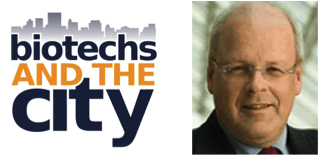‘Biotechs and the City’ Part 3/7 - The Wellcome Trust
The following panel transcript is taken from the 4th September ‘Biotechs and the City’ – Tech Transfer, Translational Funding and Start-Up Capital event held at Imperial College Incubator, and produced by Biotech and Money and sponsored by Marks & Clerk LLP.
The panel included Keith Blundy from Cancer Research Technology, Dr Allan Marchington from Apposite Capital, Tony Hickson from Imperial Innovations, Dr Mike Capaldi from Edinburgh BioQuarter, Richard Seabrook from the Wellcome Trust and Simon Portman from Marks and Clerk.
Terry O’Dwyer: I wanted to turn now to Richard Seabrook who is the Head of Business Development Innovations at Wellcome Trust and he’s in charge of managing translational funding.
The trust we all know plays an incredibly important role in the funding of early stage research and particularly in bridging the funding gap and that’s where I wanted to focus the questions here. How much does it take to bridge the funding gap?
Richard Seabrook: That would have been an easier question to answer 5 or 6 years ago because as Mike eluded to it’s got a lot more complex and as Tony said there’s a lot more translational innovation becoming available. It really does depend on what the exit point is, what sort of data package you need in order to attract the downstream investor and that’s much harder to predict and work out which is why you really need to develop those relationships with industry and with VC to find out how far do we have to take this project in order to make it interesting to you. Typically for us, with the type of programmes which we’re funding they can vary in scale from £1m to £3m and that’s to take something often to pre-clinical so it’s ready for the clinic, sometimes we will go beyond that where we’re convinced this is a really scientifically exciting programme in an important area of medical need and we’ll take it further than that into phase 1 or even phase 2a studies but that starts to get very expensive and we can only lift so many of those projects.
Terry O’Dwyer: You mention the need to engage with the stakeholders and the investors. What do you think are the success factors there?
Richard Seabrook: Success is a shared understanding in what it is you have to achieve so you have to talk to the PI and you have to talk the downstream investor about what has to be done in what way, what is going to make you want to buy this asset. So success is around facilitating those relationships and as you fund a programme and things change it’s around obviously nothing ever goes to plan so it’s about being able to respond to changes to the plan, agree those changes and to be able to execute those changes.
Terry O’Dwyer: I suppose the converse of that is failure. What do you think are the most common things that lead to failure?
Richard Seabrook: Usually there’s always a glimmer of hope for a programme until you’ve done the human proof of concept study and failure at that stage is difficult to overcome. That said, there’s a lot of products and drugs on the market that didn’t run a linear clinical development pathway; many of them did fail their initial studies and got there in the end, zig zagged, changed indications, changed dose, all of those things. There’s less flexibility to do that now, you’ve really got to try and get your human proof of concept study right first time because there’s less forgiveness if you get that wrong.
Terry O’Dwyer: Just to turn back to what you saying before about the role of the funder, can they do more than finance?
Richard Seabrook: We’re a project funder so we don’t see ourselves as funding working capital in the capital or when we’re funding an academic group we see ourselves as a co-investor in the programme but what we try to bring as a funder is actually some wisdom and experience and stewardship for the programme through research steering groups so we try to bring technical advice whether that’s in medicinal chemistry, regulatory, clinical trial design, we try to complement the skills of the group of which we’re funding so that it’s better equipped to progress the asset.
Part 4/7 – Marks & Clerk will be released Tuesday afternoon. However, if you can’t wait for the release of the remaining pieces of content taken from the 4th September ‘Biotechs and the City’ event held at Imperial College Incubator and sponsored by Marks & Clerk, you can download the full transcript here including the group Q&A.
If you’d like to attend any of the forthcoming events in the ‘Biotechs and the City’ series, you can see our October and November offerings here.


Leave a comment